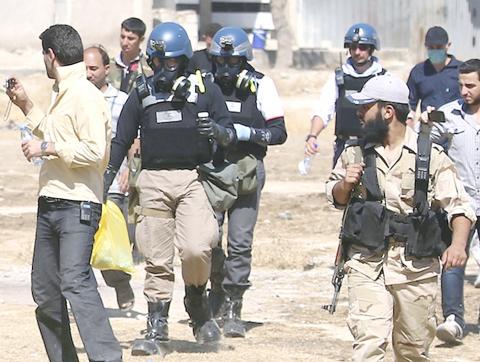The global chemical weapons watchdog working to eliminate chemical weapons stockpiles around the battlefields of Syria’s civil war won the Nobel Peace Prize yesterday.
The Organisation for the Prohibition of Chemical Weapons (OPCW), a relatively small organization with a modest budget, dispatched experts to Syria after a sarin gas attack killed more than 1,400 people near Damascus in August.
Their deployment, supported by the UN, helped avert a US strike against Syrian President Bashar al-Assad.

Photo: Reuters
Nobel Peace Prize committee head Thorbjoern Jagland said the award was a reminder to nations such as the US and Russia to eliminate their own large stockpiles, “especially because they are demanding that others do the same.”
“We now have the opportunity to get rid of an entire category of weapons of mass destruction... That would be a great event in history if we could achieve that,” he said.
The OPCW’s mission was unprecedented in taking place during a civil war that has riven the country and killed more than 100,000 people. Members of the Hague-based OPCW team themselves came under sniper fire on Aug. 26.
While the inspection and destruction of chemical weapons continues, with a team of 27 in the field, al-Assad forces and rebels clash across the country using conventional weapons.
Syrian government forces were yesterday trying to regain control of the area around the town of Safira, about 20km southeast of Aleppo. The town, controlled by rebels including the Islamic State in Iraq and the Levant, is right next to a major suspected chemical weapons site.
Yesterday’s award marked a return to the disarmament roots of the prize after some recent awards, including the EU last year and US President Barack Obama in 2009. Those awards led to criticism that the committee was out of line with the spirit of the prize, founded by Swedish industrialist Alfred Nobel, the inventor of dynamite.
His 1895 will says the prize should go to one of three causes — “fraternity between nations,” the abolition or reduction of standing armies and the formation and spreading of peace congresses.
The process of destroying chemical weapons can be hazardous and is costly. The chemicals can be burned, but with care not to disperse poisonous toxins, or chemically neutralized.
“Chemical weapons are horrible things and they must never be used and that contributes not just to disarmament, but to strengthening the humanity within us,” said Malik Ellahi, political adviser to the OPCW director-general.
The OPCW was set up in 1997 to implement a 1992 global Chemical Weapons Convention to banish chemical arms and most recently helped destroy stockpiles in Iraq and Libya. It has about 500 staff and an annual budget under US$100 million.

CARROT AND STICK: While unrelenting in its military threats, China attracted nearly 40,000 Taiwanese to over 400 business events last year Nearly 40,000 Taiwanese last year joined industry events in China, such as conferences and trade fairs, supported by the Chinese government, a study showed yesterday, as Beijing ramps up a charm offensive toward Taipei alongside military pressure. China has long taken a carrot-and-stick approach to Taiwan, threatening it with the prospect of military action while reaching out to those it believes are amenable to Beijing’s point of view. Taiwanese security officials are wary of what they see as Beijing’s influence campaigns to sway public opinion after Taipei and Beijing gradually resumed travel links halted by the COVID-19 pandemic, but the scale of

TRADE: A mandatory declaration of origin for manufactured goods bound for the US is to take effect on May 7 to block China from exploiting Taiwan’s trade channels All products manufactured in Taiwan and exported to the US must include a signed declaration of origin starting on May 7, the Bureau of Foreign Trade announced yesterday. US President Donald Trump on April 2 imposed a 32 percent tariff on imports from Taiwan, but one week later announced a 90-day pause on its implementation. However, a universal 10 percent tariff was immediately applied to most imports from around the world. On April 12, the Trump administration further exempted computers, smartphones and semiconductors from the new tariffs. In response, President William Lai’s (賴清德) administration has introduced a series of countermeasures to support affected

Pope Francis is be laid to rest on Saturday after lying in state for three days in St Peter’s Basilica, where the faithful are expected to flock to pay their respects to history’s first Latin American pontiff. The cardinals met yesterday in the Vatican’s synod hall to chart the next steps before a conclave begins to choose Francis’ successor, as condolences poured in from around the world. According to current norms, the conclave must begin between May 5 and 10. The cardinals set the funeral for Saturday at 10am in St Peter’s Square, to be celebrated by the dean of the College

CROSS-STRAIT: The vast majority of Taiwanese support maintaining the ‘status quo,’ while concern is rising about Beijing’s influence operations More than eight out of 10 Taiwanese reject Beijing’s “one country, two systems” framework for cross-strait relations, according to a survey released by the Mainland Affairs Council (MAC) on Thursday. The MAC’s latest quarterly survey found that 84.4 percent of respondents opposed Beijing’s “one country, two systems” formula for handling cross-strait relations — a figure consistent with past polling. Over the past three years, opposition to the framework has remained high, ranging from a low of 83.6 percent in April 2023 to a peak of 89.6 percent in April last year. In the most recent poll, 82.5 percent also rejected China’s